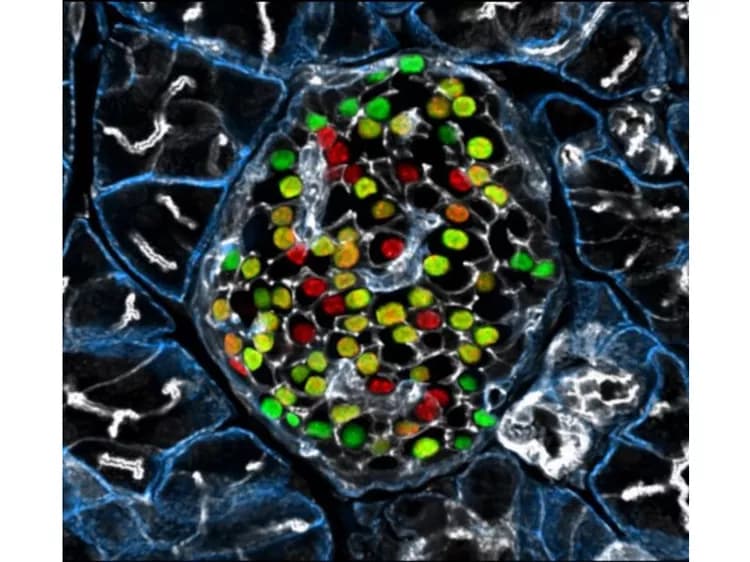The marker Flattop subdivides the insulin-producing beta cells of the pancreas into those that maintain glucose metabolism and into immature cells that divide more frequently and adapt to metabolic changes. This could provide a starting point for regenerative diabetes therapies, as scientists of Helmholtz Zentrum München, in collaboration with colleagues of the Technical University of Munich and the German Center for Diabetes Research (DZD), report in the journal Nature.
The beta cells of the pancreas produce the metabolic hormone insulin when blood glucose levels rise, in order to keep glucose levels in equilibrium. If the beta cells are destroyed or lose their function, this can lead to serious diseases such as diabetes. However, not all beta cells are identical. "It has long been known that there are different subpopulations of beta cells," said Professor Heiko Lickert, director of the Institute of Diabetes and Regeneration Research at Helmholtz Zentrum München. "But until now, the underlying molecular mechanisms have remained elusive."
Flattop is a marker for mature beta cells
In the current study, the researchers led by Lickert searched for molecular markers subdividing the respective subgroups. One molecule, in particular, captivated their attention: the protein Flattop. It was present in about 80 percent of all beta cells. These cells effectively determined the glucose concentration of their environment and secreted the corresponding amount of insulin, thus showing the metabolic properties of mature beta cells.
Cells without Flattop proliferate more frequently
Conversely, the team of researchers observed that beta cells in which no Flattop was measurable showed a particularly high rate of proliferation. "In our experimental model, these cells proliferated up to four times more often than the Flattop-positive cells," said study leader Lickert.
A type of precursor cells?
To pursue the hypothesis that the actively dividing cells (without Flattop) could be precursors of metabolically active cells, the scientists made use of a genetic trick to map the fate of single cells. This so called lineage tracing revealed that the proliferative progenitor cells were able to develop into mature beta cells with metabolic properties. This was also the case, when the scientists placed them in an artificial mini-organ-like 3D environment. Moreover, genetic analyses confirmed that in beta cells without Flattop, primarily genes responsible for sensing the environment were expressed, while in cells with Flattop primarily classic metabolic programs took place.
"Our results suggest that the Flattop-negative cells are a kind of immature reserve pool, which constantly renews itself and can replenish the mature beta cells," Lickert said. According to the study leader this new possibility of subdividing these two subgroups allows a comprehensive analysis of the signaling pathways involved. The results of the researchers raise hopes for the development of regenerative therapies: "The heterogeneity of the beta cells has been studied for more than 50 years, now with enabling technologies it looks like we are beginning to understand how the cells behave," said Lickert.
In the future, the scientist will focus on two major aspects: on the one hand in terms of regenerative therapy their goal would be to regenerate endogenous beta cells in a targeted manner to replace dysfunctional or lost cells in patients. On the other hand the findings are a milestone in the generation of functional beta cells from stem cells in cell culture for cell replacement therapy, which was not possible so far.
The above post is reprinted from materials provided by Helmholtz Zentrum Muenchen - German Research Centre for Environmental Health. Note: Materials may be edited for content and length.
Disclaimer: DoveMed is not responsible for the adapted accuracy of news releases posted to DoveMed by contributing universities and institutions.
Primary Resource:
Heiko Lickert et al. Identification of proliferative and mature β-cells in the islets of Langerhans. Nature, July 2016 DOI:10.1038/nature18624Related Articles
Test Your Knowledge
Asked by users
Related Centers
Related Specialties
Related Physicians
Related Procedures
Related Resources
Join DoveHubs
and connect with fellow professionals


0 Comments
Please log in to post a comment.